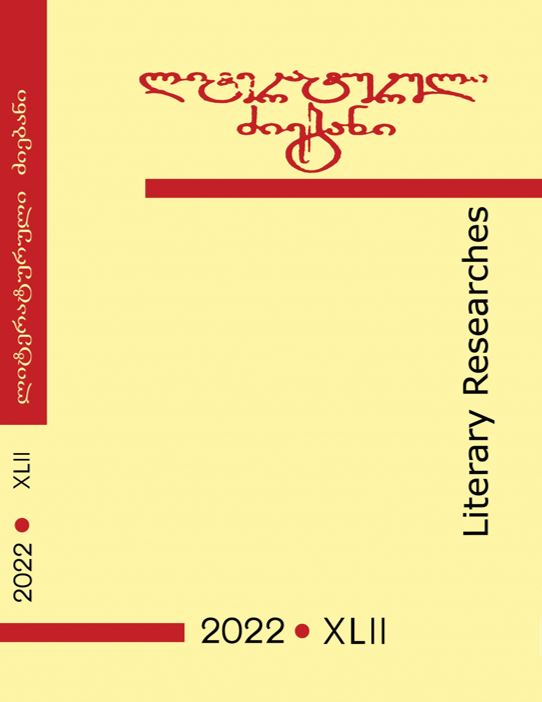Published 2022-04-30
Keywords
- Giorgi Leonidze,
- „Reminiscences“,
- Akaki Tsereteli,
- “Ole”,
- Pavle Ingorokva
How to Cite
Abstract
The article offers discussion of Giorgi Leonidze’s poem “Reminiscences”. It specifies the pieces of literature, to which the allusions are made; contents of the first stanza of the “Reminiscences” and musical intonation of the text shows that it contains hint on Akaki Tsereteli’s “White Hair”, in further stanzas the allusions are made on Giorgi Leonidze’s poems written in the
earlier period – these are: “The Song of First Snow”, “Ninotsminda Night”, “Kipchak With His Date”, “Night of Iori”, “Guineafowl” and “Ole”.
The article is focused on Giorgi Leonidze’s poem “Ole”. In Georgian, “Ole” means the tree standing along and mostly used as shadow. Poet dedicates his poem to it. There is no common view in the scientific community about what Giorgi Leonidze wanted to say in this poem. Some researchers regard that Ole implies Georgia, a country that has suffered much and yet, it stands firmly and never falls down; in the opinion of the others, Ole is metaphoric image of Giorgi Leonidze.
In our opinion, poem “Reminiscences” would be useful for proper analysis of the poem “Ole”. In “Reminiscences” the poet says the following (we provide interlinear translation): “Why did I make Ole cry, I knew, who he was”; he did not write “what it was”, words “who he was” shows clearly that metaphorically, Ole implies an individual, person, rather than Georgia; In “Ole” Giorgi Leonidze wrote that Ole has a “golden head”, i.e. he is very clever and says that “he looks to the sky”, showing that he describes a very religious and honest person with the hints; “Ole” describes a very clever person, born to sacrifice his life to Lord and does not seek any happiness in this world… In certain sense, the poet promises him to help him in arrangement of his life, calls him a lonely person and expresses sorrow for him… Though, the verse shows how well the poet is aware that only the godly deeds make this person happy… There is an impression that when Giorgi Leonidze wrote this verse, he hurt a person, to whom the verse was dedicated and “made him cry”, it seems that the verse was dedicated to such a person, which did not regard him as a lonely one and believed that serving to the high ideals does not require
any sorrow; that such person is always with Lord… We doubt that Giorgi Leonidze implied himself in such character; that he was so unhumble with regard of himself, therefore, we regard that we should seek Ole’s prototype among people close to Giorgi Leonidze. We discussed this issue in the article about great Georgian scientist Pavle Ingorokva and we regard that we should
seek Ole’s prototype among the persons like Ingorokva; Pavle Ingorokva was the friend of the poets’ order, named Blue Horns and Giorgi Leonidze was a member of that order; earlier, Pavle Ingorokva intended to be a poet and, generally, he was known as a person dedicated to his native country and science, a person like a saint (see details of this issue in our article: One More Evening Dedicated to a Person Dedicated to Lord” in the collection published by Rostom Chkheidze: “Postmodernist Novel About Pavle Ingorokva; New Eleazar”; /2021 / and the same article in magazine “Gantiadi“; № 7-8, 2021).
In the poem “Reminiscences”, initially the poet shows his sadness because of becoming older, as did Akaki Tsereteli and further, referring to the verses written when he was young, recalls his youth and in the next to the last stanza, again following Akaki Tsereteli’s intonations, focuses the reader’s attention to his “White Hair”, – following the style of mentioned poet, already aged, he asks, whether he is able to write as before and in the last stanza he states that irrespective of age, he will still be able to write the poems as before.
Giorgi Leonidze was distinguished with his optimism and ends this poem optimistically as well.

